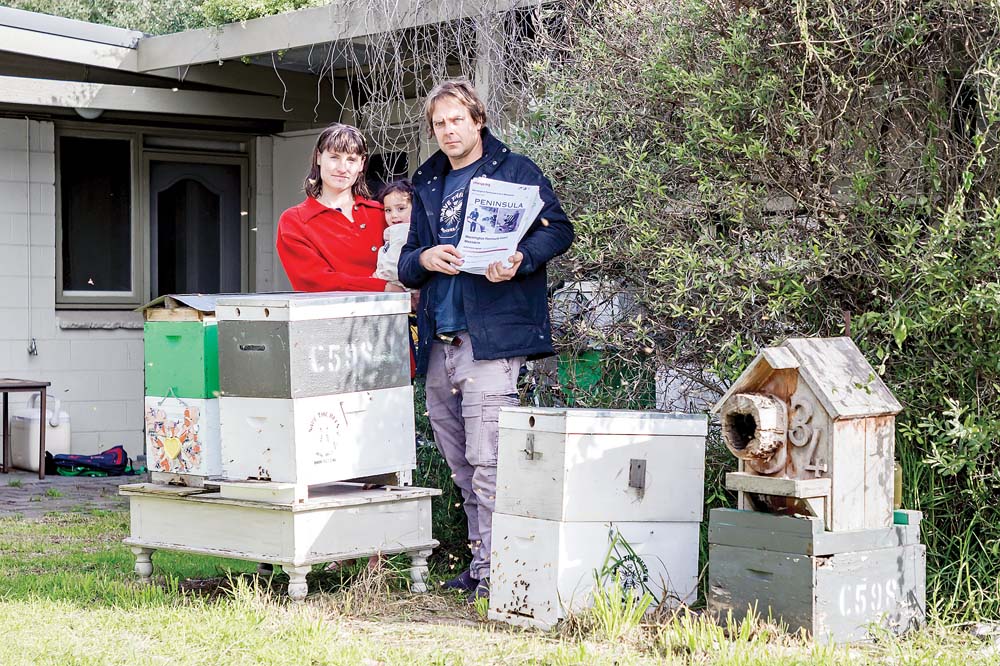
A CONTROVERSIAL study into the causes and prevention of the devastating Buruli ulcer could lead to parts of Rye, Sorrento, Blairgowrie and Tootgarook being sprayed with chemicals in coming months.
Mornington Peninsula Shire mayor, Cr David Gill has called on the state government to stop the study until a “full environmental impact assessment” has been made.
He says the program being run by the Department of Health and Human Services is being carried out with “little regard for the environment or [its] effect on people”.
The “cluster randomised control trial” would involve dousing nature strips with a synthetic pyrethroid pesticide in the October to April mosquito breeding season, as well as “fogging”, or spraying insecticide mist in mosquito-prone areas.
Larvicide – blocks of methoprene – could also be dropped into public waterways to kill larvae in the insect’s breeding grounds.
The 76 residential areas selected for the trials are those with the “highest risk” of being hit by the flesh-eating ulcer on the Mornington Peninsula, according to the Beating Buruli website.
The study was launched in April 2018 by the Department of Health and Human Services, Doherty Institute, Barwon Health, Austin Health, CSIRO, Agriculture Victoria, University of Melbourne and Mornington Peninsula Shire.
It aims to better understand Buruli and find ways to combat it (“Experts unite in two-year plan to find ulcer cause” The News 30/4/18).
The proposed chemical efforts to tackle the infection (also known as Bairnsdale ulcer) unleashed a storm of protest on the peninsula last week, including an online petition which had attracted 10,000-odd signatures by Friday afternoon.
Petition organiser Simon Mulvany accused Mornington Peninsula Shire Council of “potentially risking the health of its constituents and decimating the indigenous bee population and other pollinators” through the proposed trials.
Mr Mulvany compared “fogging” to using “industrial strength Mortein misted from the back of trucks” which would lead to an insect “massacre”.
He described the proposed trials as an “impulsive strategy”, saying residents were “furious they still have not been officially informed about the spraying that will cover from Portsea to St Andrews”.
“Residents have not consented to this intervention,” he said.
It is not known how people become infected with the ulcer, but studies indicate mosquitoes may spread it. About 90 cases have been reported in Victoria this year – with half on the Mornington Peninsula.
But study lead Dr Tim Stinear played down concerns over health risks saying synthetic pyrethroid pesticides had a “long history of safe and effective use in mosquito control activities”.
He said fogging would “only be used if necessary and may not be required at all”.
“If fogging is to happen it will be very localised and residents could object to it being carried out in their areas,” he said.
Describing the project as “still in the planning stage” he said there would be “plenty of community consultation” with residents in the study areas.
“A community consultation process is being planned, and our approach will be further informed by these conversations,” he said.
The Beating Buruli website said synthetic pyrethroids were harmful to bees and fish. Dr Stinear said the research team would be “making every effort to minimise any impact to the local bee populations” – meaning spraying would not be done near beehives or fishponds.
“Residents with beehives will be advised to cover or move them when the spraying is taking place. Residents with a fishpond will be advised to cover it.”
First published in the Southern Peninsula News – 23 July 2019